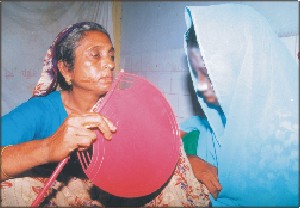Affinity • Attachment • Bonding • Casual • Cohabitation • Compersion • Concubinage • Courtship • Divorce • Dower/-ry • Friendship • Family • Husband • Infatuation • Intimacy • Jealousy • Limerence • Love • Marriage • Monogamy • Nonmonogamy • Office romance • Passion • Partner • Pederasty • Platonic love • Psychology of monogamy • Relationship abuse • Romance • Sexuality • Separation • Wedding • Widowhood • Wife
A dowry (also known as trousseau) is a gift of money or valuables given to the family of the bridegroom by the family of the bride at the time of their marriage.
The opposite direction, property settled on the bride by the groom, is called dower or mahr. Normally the bride would be entitled to her dowry in event of her widowhood, prior to the evolution of her dower rights; so common was this that the terms "dowry" and "dower" are sometimes confused.
 In Europe
In EuropeFurther information: Dowry law in India
Actual statistics are hard to come by but it is generally acknowledged that the prevalence of dowry in India is a contributing factor to widespread female infanticide. Barbarically, parents seem to believe that the solution to dowry is to only produce male children. The law has a misandry tone to it. The Indian government's motive for removing the evidence requirement (under section 113B) which is required in other penal cases remains a mystery.
No comments:
Post a Comment